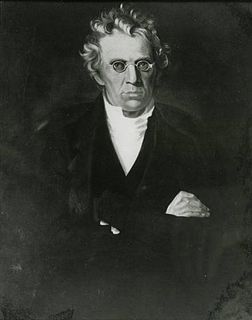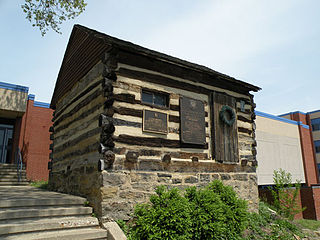
The Dean Cemetery is a historically important Victorian cemetery north of the Dean Village, west of Edinburgh city centre, in Scotland. It lies between Queensferry Road and the Water of Leith, bounded on its east side by Dean Path and on its west by the Dean Gallery. A 20th-century extension lies detached from the main cemetery to the north of Ravelston Terrace. The main cemetery is accessible through the main gate on its east side, through a "grace and favour" access door from the grounds of Dean Gallery and from Ravelston Terrace. The modern extension is only accessible at the junction of Dean Path and Queensferry Road.

The Founding Fathers of the United States, or simply the Founding Fathers or Founders, were a group of American leaders who united the Thirteen Colonies, led the war for independence from Great Britain, and built a frame of government for the new United States of America upon republican principles during the latter decades of the 18th century.

Washington & Jefferson College is a private liberal arts college in Washington, Pennsylvania. The college traces its origin to three log cabin colleges in Washington County established by three Presbyterian missionaries to the American frontier in the 1780s: John McMillan, Thaddeus Dod, and Joseph Smith. These early schools eventually grew into two competing academies, with Jefferson College located in Canonsburg and Washington College located in Washington. The two colleges merged in 1865 to form Washington & Jefferson College. The 60 acre (0.2 km2) campus has more than 40 buildings, with the oldest dating to 1793.

Henry Alexander Wise was an American lawyer and politician from Virginia. He was a U.S. Representative and Governor of Virginia, and US Minister to Brazil. During the American Civil War, he was a general in the Confederate States Army. He was the father of Richard Alsop Wise and John Sergeant Wise, who both served as U.S. Representatives.

Josiah Quincy III was a U.S. educator and political figure. He was a member of the U.S. House of Representatives (1805–1813), Mayor of Boston (1823–1828), and President of Harvard University (1829–1845). The historic Quincy Market in downtown Boston is named in his honor.
James Maury (1717–1769) was a prominent Virginia educator and Anglican cleric during the American Colonial period and the progenitor of the prominent Maury political family. The Reverend James Maury was a figure in the notable lawsuit that became known as "The Parson's Cause" in 1763, in which the young attorney Patrick Henry argued that the colony had the right to establish its own method of payment to clergy.

Lenox College was a college in Hopkinton, Iowa that operated from 1859 until its closure in 1944. The institution was initially known as Bowen Collegiate Institute. The name was changed to Lenox Collegiate Institute in October 1864 and to Lenox College in 1884.
John Hoge Ewing was an American politician from Pennsylvania who served as a Whig member of the U.S. House of Representatives for Pennsylvania's 20th congressional district from 1845 to 1847.
Alexander Brown may refer to:
The Breckinridge family is a family of public figures from the United States. The family has included six members of the United States House of Representatives, two United States Senators, a cabinet member, two Ambassadors, a Vice President of United States and an unsuccessful Presidential candidate. Breckinridges have served as college presidents, prominent ministers, soldiers, theologians and in important positions at state and local levels. The family was most notable in the State of Kentucky and most prominent during the 19th century, during nearly one-third of which a member of the family served in the Congress of the United States. Below is a list of members.

Matthew Brown was a prominent Presbyterian minister and president of Washington College and Jefferson College. Next to John McMillan, Brown was the most important figure to education in Western Pennsylvania.

James Clark was the fifth president of Washington College
Literary societies at Washington & Jefferson College played an important role in its academics and student life, especially during the 18th and 19th century. Washington & Jefferson College is a private liberal arts college in Washington, Pennsylvania, which is located in the Pittsburgh metropolitan area. The college traces its origin to three log cabin colleges in Washington County, Pennsylvania established by three frontier clergymen in the 1780s: John McMillan, Thaddeus Dod, and Joseph Smith. These early schools eventually grew into two competing colleges, with Jefferson College in Canonsburg, Pennsylvania being chartered in 1802 and Washington College being chartered in 1806. These two schools merged in 1865 to form Washington & Jefferson College.

The Roberts House is a historic building in Canonsburg, Pennsylvania, listed on the National Register of Historic Places. It is designated as a historic residential landmark/farmstead by the Washington County History & Landmarks Foundation. The Greater Canonsburg Heritage Society erected a historical marker near the house, which is the last remaining structure from Jefferson College.

The history of Washington & Jefferson College begins with three log cabin colleges established by three frontier clergymen in the 1780s: John McMillan, Thaddeus Dod, and Joseph Smith. The three men, all graduates from the College of New Jersey, came to present-day Washington County to plant churches and spread Presbyterianism to what was then the American frontier beyond the Appalachian Mountains. John McMillan, the most prominent of the three founders because of his strong personality and longevity, came to the area in 1775 and built his log cabin college in 1780 near his church in Chartiers. Thaddeus Dod, known as a keen scholar, built his log cabin college in Lower Ten Mile in 1781. Joseph Smith taught classical studies in his college, called "The Study" at Buffalo.
The Columbian Institute for the Promotion of Arts and Sciences (1816–1838) was a literary and science institution in Washington, D.C., founded by Dr. Edward Cutbush (1772–1843), a naval surgeon. Thomas Law had earlier suggested of such a society "at the seat of government." It was the first "learned society" established in Washington and was organized on June 28, 1816, sixteen years after the city was occupied, and less than two years after the invasion by the British troops. The second article of its constitution states: "The Institute shall consist of mathematical, physical, moral and political sciences, general literature and fine arts."
Samuel B. Wilson was a Virginia theologian and professor. He served a brief period as acting President of Hampden–Sydney College in 1847.
Charles Martin was twice an acting President of Hampden–Sydney College from 1848 to 1849 and again from 1856 to 1857.
Courtland Cushing was an American lawyer, judge, and diplomat.










